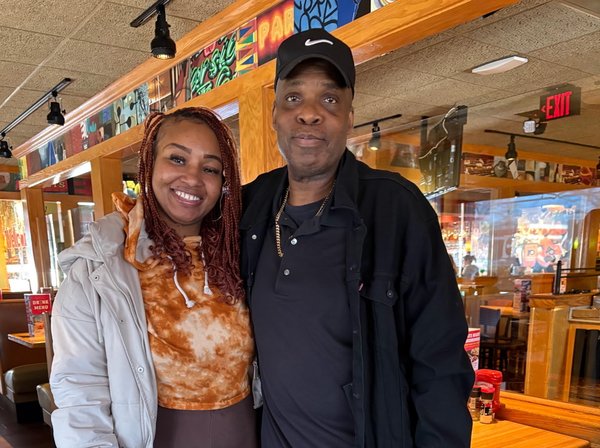Curtis Clinton didn't know why he was feeling sick, having trouble walking and had dropped 80 pounds. When he wound up in Temple University Hospital in October, he found out he had stage 4 prostate cancer.
Clinton, a lifelong Philadelphia resident, had to stop working as a home health aide after 20 years of helping people with non-medical, personal care and companionship. He couldn't go out with his fiancé on the weekends and didn't have much energy for his grandchildren. Clinton, 60, said he sank into a depression and "just wanted to be left alone."
MORE: Fasting during Ramadan was harder this year for this Philly woman – but that's a byproduct of her weight-loss success
Fortunately, Clinton had become a patient in a Temple Health's new Trauma-Informed Oncology Evaluation Clinic that screens, diagnoses and treats people at risk for cancer who have trouble accessing high-quality medical care due in part to decades of systemic, structural racism. The clinic, also known as MVP-CAN, provides wrap-around medical, social and emotional support to patients from communities where educational and socioeconomic barriers have led to a lack of wealth accumulation and health insurance – as well as poorer health outcomes.
"In North Philadelphia, our average age of death is actually much lower — by about 8 1/2 to 10 years, depending if you look at males and females — compared to Center City, which is 2 1/2 miles away," said Dr. Dharmini Shah Pandya, associate professor of clinical medicine at Temple's Lewis Katz School of Medicine. "So that's the framework we're starting with, and a lot of it has to do with understanding health care and health literacy."
The program uses what its physicians describe as a "high-touch" approach to help its patients make informed decisions about their treatment. Patients who might otherwise receive substandard care or fall through the cracks get red-carpet service, often with as few as two weeks between being diagnosed with cancer and starting treatment, compared to what can often take several months, Shah said.
"That's what health equity means to us: You come, and we'll give you what you need, because we know you have all these social barriers," Shah said.
A clinic focused on outreach
"We feel like this is our purpose to reach out into the community to pull these patients in to make sure they get the care, which is different than sort of sitting here and waiting for them to find us," said Dr. Claire Raab, president and chief executive officer of Temple Faculty Physicians.
- How to access the clinic
- The MVP-CAN is located on the fourth floor of the Boyer Pavilion at Temple University Hospital's main campus. The number for referrals outside of Temple University Hospital is (215) 707-2098.
Raab helped start the cancer clinic in May with Shah and Dr. Rachel Rubin, Temple's section chief of hospital medicine. The team has been treating more than 200 patients who receive expedited access to Temple specialists to diagnose suspected cancers.
"Patient navigator" Sabrina Bryant, a trauma-informed, financial and insurance wiz with a comforting bedside manner, coordinates treatment and follow-up care.
With the help of an immense spreadsheet, Bryant schedules and tracks appointments for patients, sets up rides for people who need them, gets patients insurance coverage, prior approvals and prescriptions, and even helps some people with food and housing.
"If you're not having your basic needs met, it's really hard to take care of your health," Rubin said.
A source for emotional support
A big part of Bryant's job is translating medical jargon into language that is easier to understand. She also provides emotional support.
When a patient receives a diagnosis, "I just immediately give out hugs to everybody that's involved, right there – the patient, the family member, the caregiver – because the patient has a long haul coming," Bryant said.
After being diagnosed with prostate cancer, Clinton said he felt overwhelmed. But Bryant provided help with logistics, as well as comfort and encouragement, Clinton said.
Bryant would tell him, "You can't just let your life stop like that. You've got to keep living," Clinton said. "Without her, I don't know where I would be right now."


